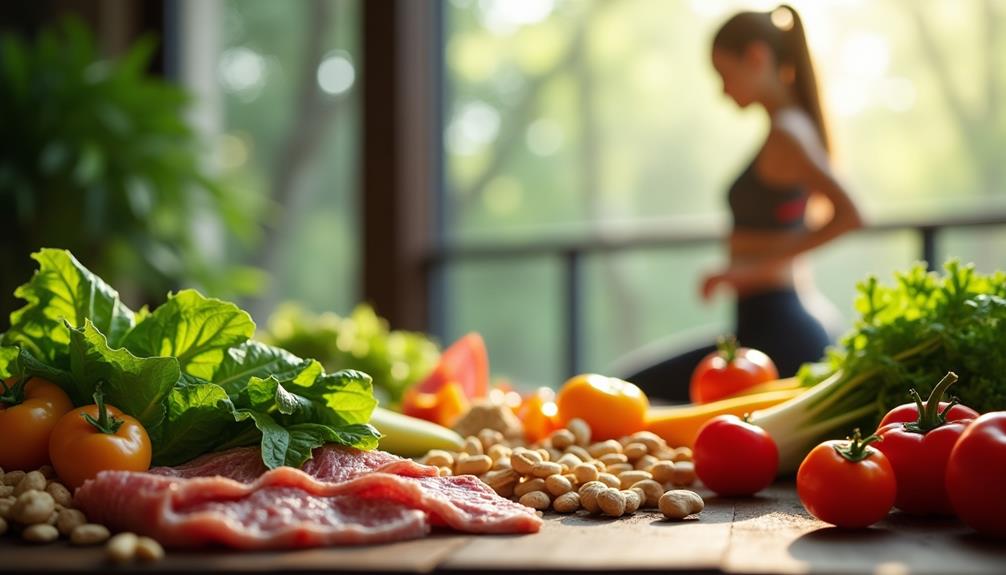To boost muscle healing, consider adding these 10 nutrient-rich foods to your diet. First, lean chicken breast and salmon are excellent sources of protein and omega-3 fatty acids, essential for muscle repair. Quinoa and lentils provide plant-based protein alongside valuable vitamins and minerals. Incorporate spinach for its iron and antioxidants, and enjoy Greek yogurt for its protein and probiotics that support recovery. Sweet potatoes offer complex carbs, while nuts and seeds provide healthy fats. Finally, eggs are a versatile protein source. By focusing on these foods, you'll help nourish your muscles and promote faster recovery. Learn more about their specific benefits ahead!
Core Insights
- Lean chicken breast provides high-quality protein essential for muscle tissue repair and recovery after workouts.
- Salmon is rich in omega-3 fatty acids, which help reduce inflammation and support overall muscle healing.
- Greek yogurt offers protein and probiotics, enhancing muscle recovery and digestive health after physical activity.
- Quinoa serves as a complete protein source, packed with vitamins and minerals that aid in muscle healing and energy replenishment.
- Blueberries are high in antioxidants, reducing inflammation and promoting faster recovery following intense exercise.
Lean Chicken Breast
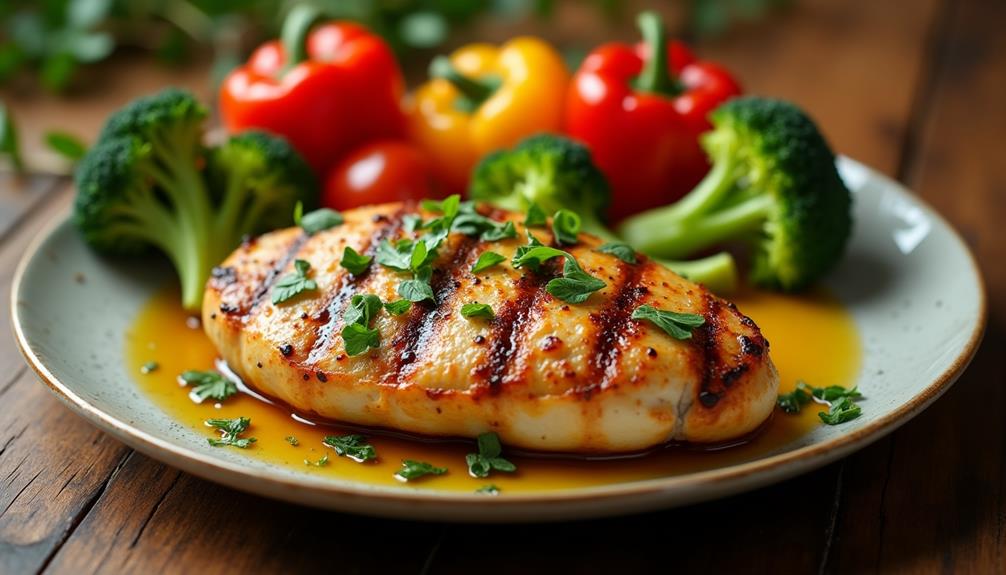
Incorporating lean chicken breast into your diet is a smart move for muscle healing. This protein-packed food is crucial for repairing and rebuilding muscle tissue. Each serving contains essential amino acids that help promote recovery after physical activity. Much like whey protein powders, lean chicken breast provides a high-quality protein source with low fat content, making it ideal for those looking to support muscle recovery while managing their calorie intake.
Lean chicken breast is low in fat, making it a healthier choice compared to other meats. When you grill, bake, or roast it, you preserve its nutrients while keeping calories in check.
Additionally, it's versatile. You can add it to salads, stir-fries, or sandwiches, making it easy to include in your meals. Aim for consistent consumption throughout the week to maximize its benefits. By prioritizing lean chicken breast, you're supporting your body's recovery process effectively and efficiently.
Quinoa
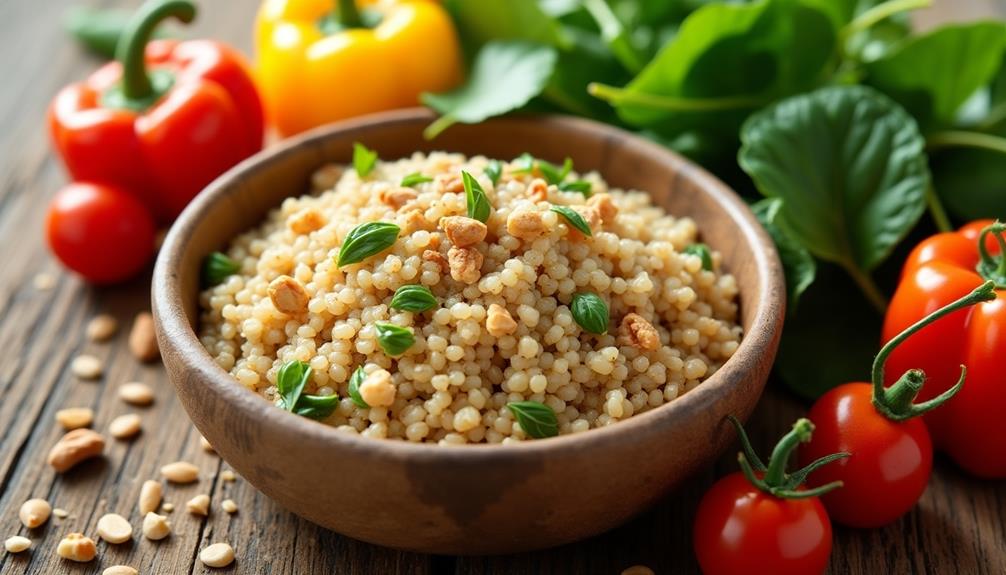
Quinoa is a powerhouse food that plays an essential role in muscle healing. Packed with protein, it provides the amino acids your body needs to repair muscle tissues. Unlike many grains, quinoa is a complete protein, meaning it contains all nine essential amino acids. This quality makes it particularly beneficial for muscle recovery after workouts. For those looking to supplement their protein intake, gluten-free protein powders can be an excellent addition to a quinoa-based diet, offering variety and convenience.
Moreover, quinoa is rich in vitamins and minerals, including magnesium and iron, which support overall muscle function and energy levels. Its high fiber content aids digestion, ensuring your body effectively absorbs these nutrients.
Incorporating quinoa into your meals can be simple; try it in salads, bowls, or as a side dish. By choosing quinoa, you're giving your body the nutrients it needs for peak healing.
Spinach
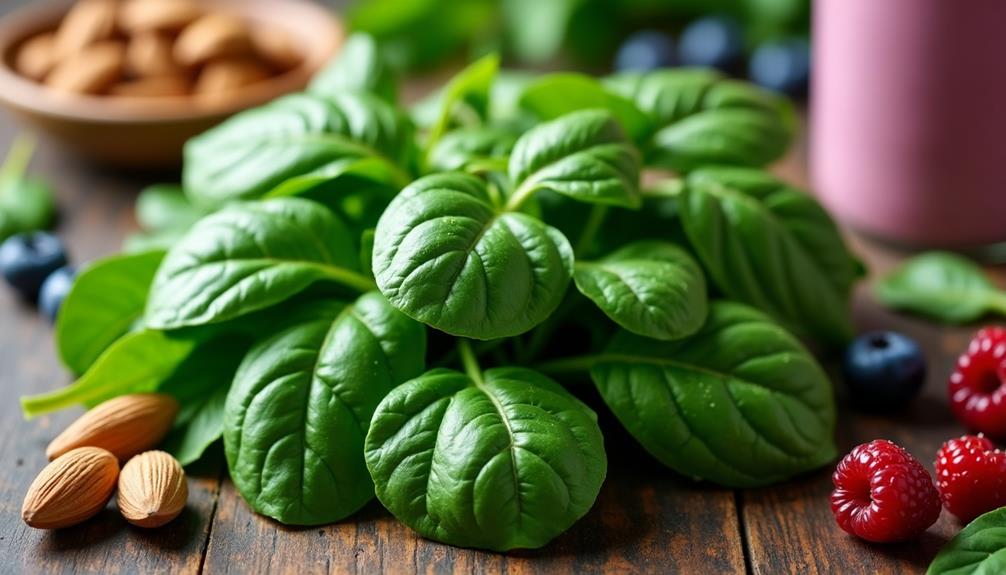
Packed with nutrients, spinach is an excellent food choice for muscle healing. This leafy green is rich in vitamins A, C, and K, along with essential minerals like iron and magnesium. These nutrients support your immune system and help reduce inflammation, which is vital during recovery. Spinach also contains antioxidants similar to those found in mushroom extracts, which can help combat oxidative stress and promote overall healing.
Eating spinach can also boost your protein intake. The amino acids found in spinach aid in muscle repair and growth. Its high antioxidant content helps combat oxidative stress, promoting overall healing.
You can easily incorporate spinach into your meals. Toss it in salads, blend it into smoothies, or sauté it with other vegetables. No matter how you enjoy it, adding spinach to your diet can enhance your muscle recovery process, keeping you on track to achieving your fitness goals.
Salmon
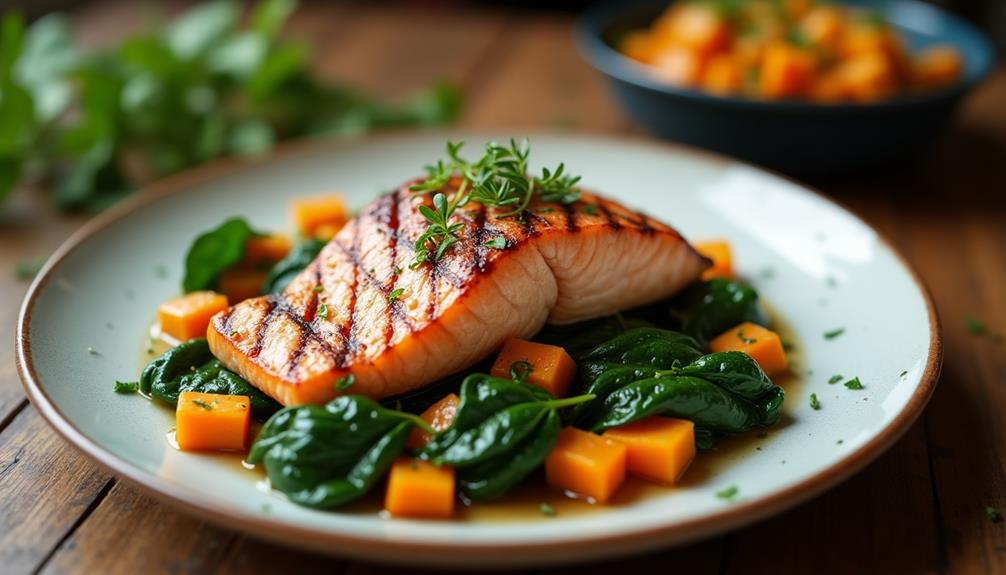
When you think about nutrient-dense foods that support muscle healing, salmon should definitely come to mind. This fatty fish is packed with essential nutrients that aid recovery and promote overall health. Here are three key benefits of incorporating salmon into your diet:
- Rich in Omega-3 Fatty Acids: These healthy fats reduce inflammation and help repair muscle tissue.
- High-Quality Protein: Salmon provides a significant amount of protein, which is vital for muscle repair and growth.
- Vitamins and Minerals: It's loaded with vitamins B12 and D, along with selenium, all of which support energy levels and immune function.
Including salmon in your meals can enhance your muscle healing journey, making it a delicious and nutritious choice.
Greek Yogurt
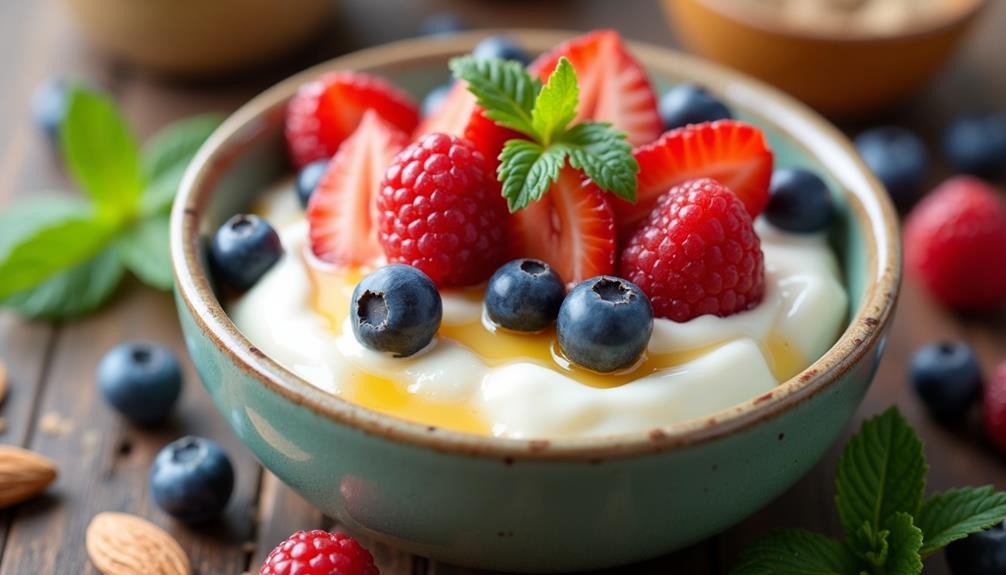
Greek yogurt is a powerhouse of nutrition that plays an integral role in muscle healing. Packed with protein, it provides the building blocks your body needs to repair and rebuild muscle tissue after workouts. This creamy delight contains probiotics, which support gut health and enhance nutrient absorption, making it easier for your body to utilize the nutrients for recovery.
Moreover, Greek yogurt is rich in calcium, crucial for bone strength and muscle contraction. You can easily incorporate it into your diet by adding it to smoothies, using it as a base for sauces, or enjoying it with fruits and nuts. By including Greek yogurt in your meals, you'll be giving your muscles the support they need to heal and thrive.
Blueberries
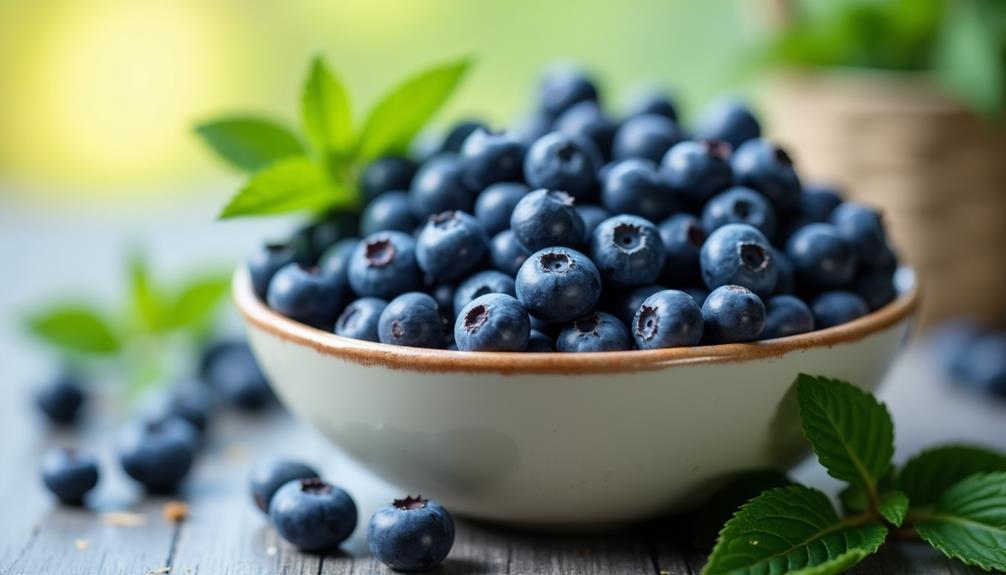
Although often overlooked, blueberries are a nutritional powerhouse that can greatly aid in muscle healing. These tiny fruits pack a punch with their rich antioxidant content, which helps reduce inflammation and promotes recovery. Including blueberries in your diet can enhance your healing process, especially after intense workouts.
Here are three benefits of blueberries for muscle healing:
- Antioxidants: Blueberries contain high levels of antioxidants, which combat oxidative stress caused by exercise.
- Anti-Inflammatory Properties: They help reduce inflammation, allowing your muscles to recover faster.
- Vitamins and Minerals: Blueberries are rich in vitamins C and K, essential for overall health and recovery.
Incorporating blueberries into your meals can be as simple as adding them to smoothies, yogurt, or oatmeal.
Sweet Potatoes
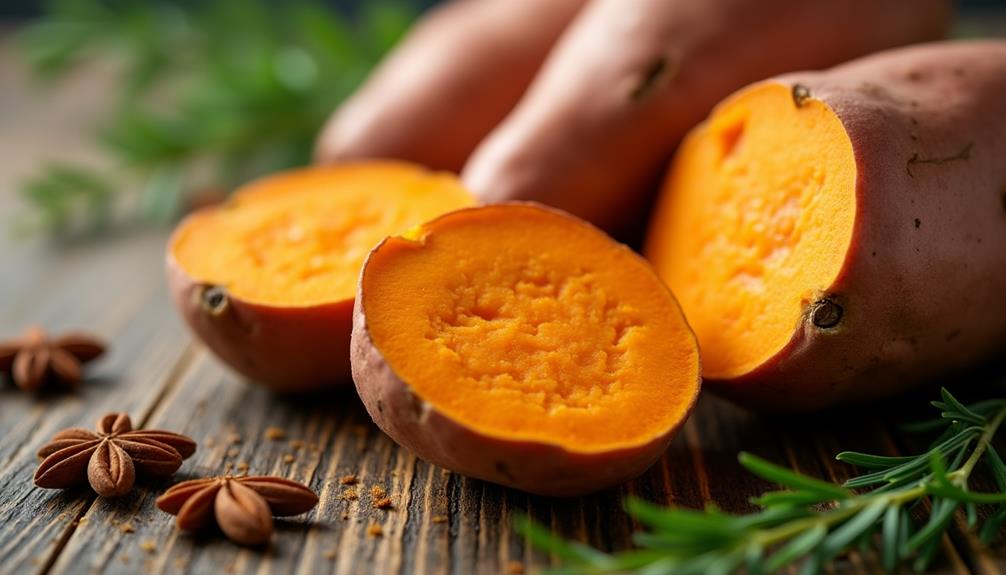
Sweet potatoes are a fantastic addition to your diet if you're looking to support muscle healing. Packed with vitamins A and C, they help reduce inflammation and promote recovery. Their high fiber content aids digestion, ensuring your body absorbs the nutrients effectively.
Moreover, sweet potatoes provide complex carbohydrates, which are essential for replenishing your energy stores after a workout. This helps prevent fatigue and prepares your muscles for the next challenge.
You can enjoy them baked, mashed, or even as fries, making them a versatile option for any meal. Just remember to keep the skin on for added nutrients. Incorporating sweet potatoes into your meals can greatly enhance your muscle recovery journey.
Nuts and Seeds
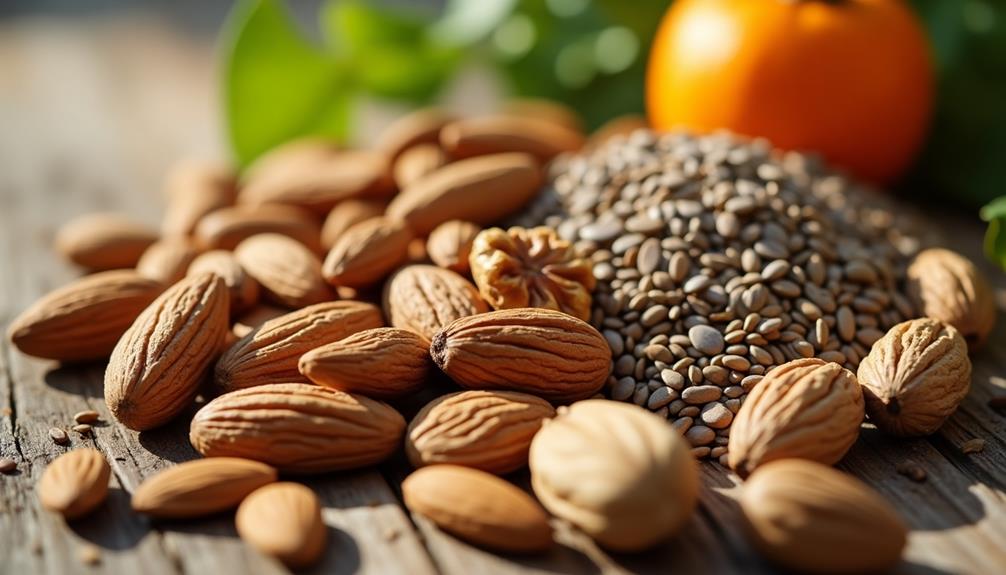
Here are three beneficial options to ponder:
- Almonds: Rich in vitamin E and magnesium, almonds can help reduce oxidative stress in your muscles.
- Chia Seeds: These tiny seeds are loaded with omega-3 fatty acids, which can aid in reducing inflammation and speeding up recovery.
- Pumpkin Seeds: High in zinc and magnesium, pumpkin seeds can enhance muscle repair and support overall recovery.
Incorporating these nuts and seeds into your meals can make a significant difference in your muscle healing journey.
Eggs
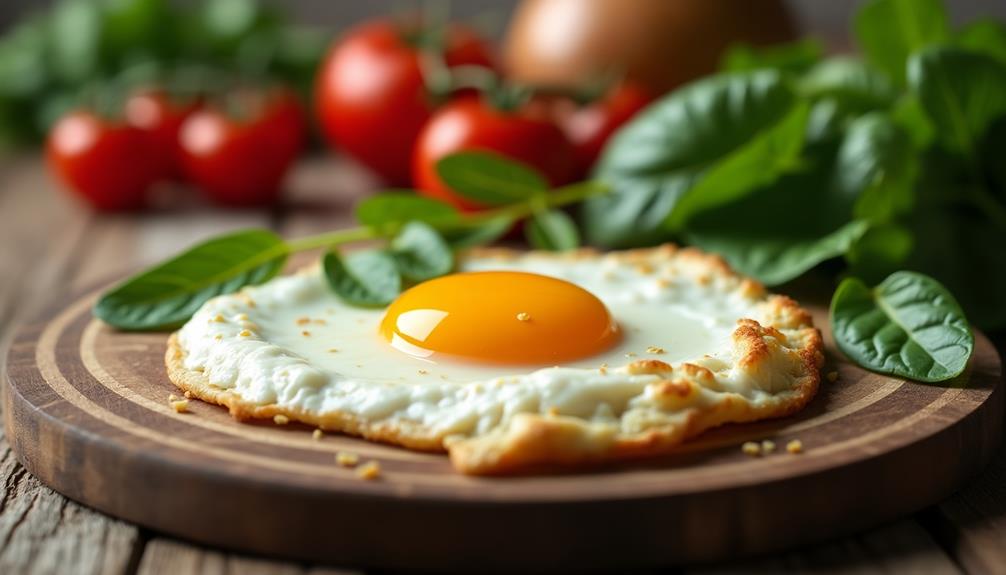
Eggs are a powerhouse of nutrients that play a significant role in muscle healing. They're an excellent source of high-quality protein, essential for repairing damaged tissues. Each egg contains all nine essential amino acids, which your body needs for effective recovery.
Additionally, eggs are rich in vitamins D and B12. Vitamin D helps with calcium absorption, supporting bone health, while B12 is essential for energy production and red blood cell formation.
You'll also find choline in eggs, which aids in muscle function and recovery. Including eggs in your diet can enhance your overall muscle healing process. Whether you scramble, boil, or poach them, make eggs a staple in your meals to reap these benefits.
Lentils
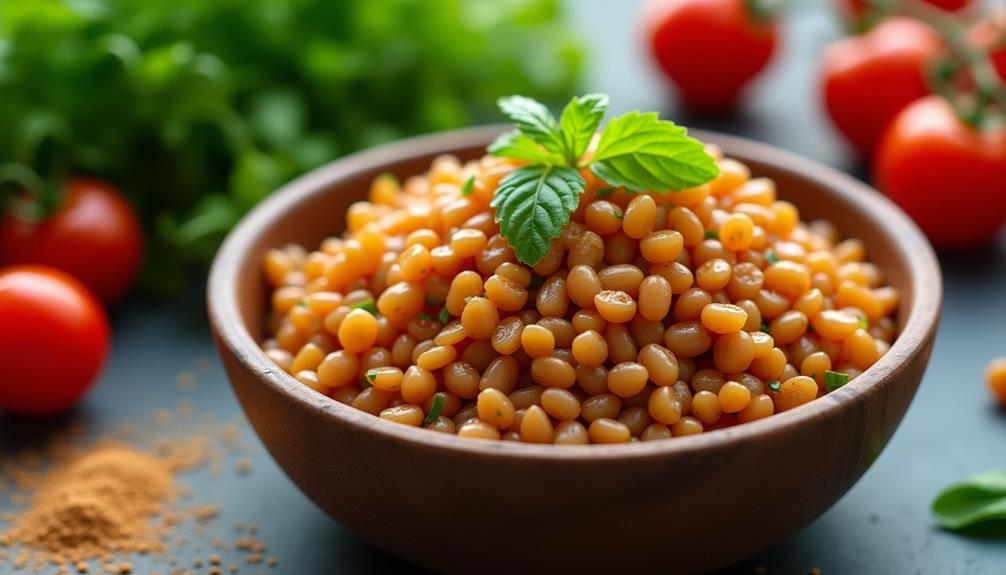
Here are three reasons to include lentils in your diet:
- Crucial Protein Content: Lentils contain about 18 grams of protein per cooked cup, making them a great plant-based protein source.
- Abundant in Iron: They're packed with iron, which is essential for oxygen transport in your body, aiding in energy production.
- Packed with Antioxidants: Lentils have antioxidants that can help reduce inflammation, promoting faster recovery.
Adding lentils to your meals can make a significant difference in your muscle healing journey.
Frequently Asked Questions
How Much Protein Do I Need for Muscle Healing?
You need about 1.2 to 2.0 grams of protein per kilogram of body weight daily for best muscle healing. Adjust based on your activity level and recovery needs, ensuring you're meeting your body's demands effectively.
Can I Substitute These Foods With Processed Options?
Did you know that 70% of processed foods lack essential nutrients? You can substitute some foods, but processed options often don't provide the same health benefits. It's best to stick with whole foods for peak nutrition.
How Long Should I Follow a Nutrient-Rich Diet?
You should follow a nutrient-rich diet for at least a few weeks to notice significant changes. Consistency is key, so make it a habit. Your body will thank you for the positive impact on your health.
Are There Any Food Allergies to Consider With These Options?
When considering food options, you should always check for allergies. Common allergens like nuts, dairy, and gluten can impact your choices. It's essential to read labels and consult with a healthcare provider if unsure.
What Are the Best Cooking Methods to Preserve Nutrients?
When cooking, think of nutrients as precious jewels. Steaming, sautéing, or microwaving keeps them shining bright. Avoid boiling; it washes away their brilliance. Treat your food with care, and you'll savor every nutrient-packed bite.

